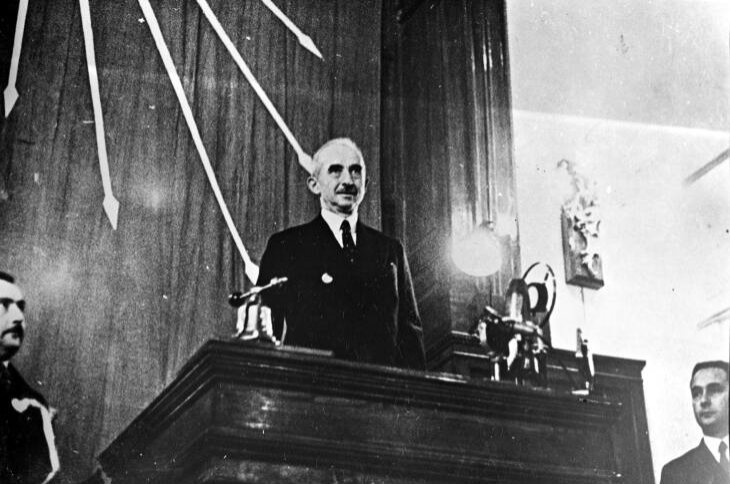langerhanscellhistiocytosis.org – İsmet İnönü, the second president of Turkey, played a crucial role in the political and economic development of the Turkish Republic during a period of significant transition. As a close ally and military leader under Mustafa Kemal Atatürk, İnönü’s presidency (1938–1950) was marked by challenges of wartime diplomacy, economic difficulties, and the gradual shift toward a more democratic system. Although his presidency saw Turkey facing the complexities of a world on the brink of World War II and dealing with the aftermath, İnönü’s leadership was pivotal in shaping the early years of the republic after Atatürk’s death.
Early Life and Political Career
İsmet İnönü was born on September 24, 1884, in the Ottoman Empire, in a period when the empire was in decline. His early years were shaped by a commitment to education and public service, studying at the Ottoman Military Academy, where he developed his military career. İnönü rose to prominence as a soldier during the Balkan Wars and World War I, becoming a trusted officer in the Turkish War of Independence. He was a key figure in the Turkish National Movement, serving under Mustafa Kemal Atatürk in the struggle against foreign occupation and the disintegration of the Ottoman Empire.
İnönü’s military and political acumen led to his appointment as the first Chief of Staff of the Turkish Army, and he was one of Atatürk’s closest collaborators. His contributions to the Turkish War of Independence, particularly his leadership during the successful battles at İnönü (1921), earned him both recognition and respect within the new republic.
İnönü as President: The Post-Atatürk Era (1938–1950)
Following the death of Mustafa Kemal Atatürk in 1938, İsmet İnönü assumed the presidency of Turkey, a position he held until 1950. İnönü inherited a country that had undergone dramatic transformations under Atatürk, with a focus on modernization, secularism, and national unity. However, İnönü’s leadership faced new challenges, both domestic and international.
Turkey’s Neutral Stance During World War II
The onset of World War II presented difficult choices for Turkey. İnönü worked hard to maintain the country’s neutrality during the conflict, a delicate balancing act given the pressures from both the Axis and Allied powers. Turkey’s geographical position made it strategically significant, and İnönü sought to avoid being drawn into the war while preserving the sovereignty and security of the Turkish state.
İnönü’s foreign policy was largely focused on preserving Turkey’s independence, and the country maintained a cautious diplomatic stance throughout the war. Although Turkey was officially neutral, İnönü offered assistance to the Allies in the form of military supplies and resources, hoping to protect Turkey’s interests in the post-war order.
Economic Challenges and Reforms
Economically, İnönü’s time as president was marked by the aftermath of the Great Depression and the challenges of wartime scarcity. The Turkish economy struggled during the 1930s and 1940s, and while İnönü continued many of Atatürk’s policies of state-led industrialization, economic recovery was slow and uneven. The war disrupted trade, and Turkey faced difficulties in securing necessary imports, leading to shortages and inflation.
Despite these challenges, İnönü’s government worked to modernize Turkey’s infrastructure, improving railways, roads, and communications. In the post-war years, there were efforts to promote economic self-sufficiency, but the country remained dependent on foreign aid, particularly from the United States under the Marshall Plan.
Political Transition and Multi-Party System
One of the defining features of İnönü’s presidency was the gradual shift toward a multi-party political system. In the early years of the republic, Turkey had operated under a single-party system, with Atatürk’s Republican People’s Party (CHP) at the helm. However, İnönü recognized the need for political pluralism and, by the late 1940s, began to move towards greater democratic participation.
In 1946, after years of political pressure and international developments, Turkey held its first multi-party elections. The Democratic Party (DP), led by Adnan Menderes, emerged as a significant political force. Although İnönü’s Republican People’s Party remained dominant during the election, this marked the beginning of a shift in Turkish politics, signaling the end of the single-party era.
Democratic Elections and İnönü’s Declining Popularity
İnönü’s popularity waned in the post-war period, especially as the country struggled with economic hardship and the political dynamics shifted in favor of opposition forces. The Democratic Party, which promised economic reforms and greater political freedoms, garnered increasing support among the population. İnönü, whose policies were seen as cautious and at times outdated, faced growing criticism for his handling of Turkey’s economic and political problems.
In 1950, following a tense election campaign, the Democratic Party won a decisive victory in the general elections, marking the first peaceful transfer of power in Turkey’s republican history. İnönü conceded defeat and stepped down from the presidency, marking the end of his political dominance.
Legacy and Later Life
Although İnönü’s time as president was marked by political and economic challenges, his legacy as a statesman is significant. His leadership helped steer Turkey through a volatile period of global conflict, and he played a central role in maintaining Turkey’s independence and sovereignty during World War II. In the years following his presidency, İnönü continued to be involved in Turkish politics, serving as the leader of the Republican People’s Party and remaining a prominent figure in the country’s political life until his death in 1973.
İsmet İnönü’s presidency is remembered as a time of transition for Turkey—one where the country navigated complex international relations, economic struggles, and the shift toward democratic pluralism. His commitment to Atatürk’s principles of secularism, modernization, and national unity laid the foundation for the democratic institutions that would continue to evolve in Turkey in the years to come.
Today, İnönü is remembered as a respected leader who played a pivotal role in the early years of the Turkish Republic, and his contributions to the country’s development continue to be appreciated in Turkey’s modern political discourse.

